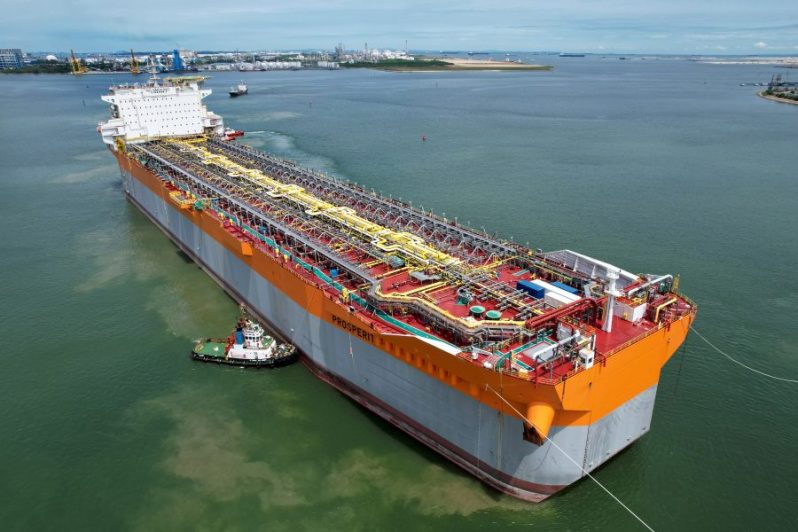— hull arrives in Singapore for next phase of construction
CONSTRUCTION of Guyana’s third Floating Production and Storage and Offloading (FPSO) vessel has progressed to another phase. On Thursday, ExxonMobil’s contractor, SBM Offshore, announced that the hull for the Prosperity FPSO had arrived safely at the Keppel yard in Singapore. “Now, the next phase of construction will commence, with the topside modules being integrated at the yard,” a statement from the company indicated.
It noted too that despite various challenges posed by the ongoing global pandemic, the unit remains on schedule to be completed in 2024. “Drydock activities are scheduled to begin in the fourth quarter of this year, with the installation of major structures that will support the Mooring and Subsea Risers,” SBM Offshore said.
It was explained that in keeping the standardisation philosophy that guides the Fast4Ward® programme, the Prosperity FPSO will largely replicate the design used for the Liza Unity FPSO. “This approach has showcased the value of Fast4Ward®, ensuring that the final product is delivered faster to our client ExxonMobil,” the statement from SBM Offshore posited.
Once installed, the vessel is intended to produce roughly 220,000 barrels of oil per day and will be able to store approximately two million barrels of crude oil.
Prosperity is slated to join her sister vessel Liza Unity, currently under construction at the same yard, and Liza Destiny, operational since end of 2019, offshore Guyana. Though the Liza Destiny has a capacity to produce 120,000 barrels of oil per day with 1.6 million barrels storage capacity, the Liza Unity and Prosperity are being designed to produce 220,000 barrels of oil per day.
In addition to the overseas constructions, some local companies are also playing their part in the construction of the vessel. For instance, the Guyana Oil and Gas Support Services Incorporated (GOGSSI) will be responsible for transforming over 30 tonnes of steel into the ladders and handrails of the vessel. Another local company, Industrial Fabrications Inc. (InFab) will also be providing parts for the Prosperity. The two companies are providing services to ExxonMobil’s prime contractor, SBM Offshore.
This is of major significance, as it marks the first time that companies in Guyana would have had the capacity to carry out such a project for the oil-and-gas sector. It also marks a substantial development in the involvement of local content in the oil-and-gas industry.
General Manager of SBM Offshore, Francesco Prazzo, had previously emphasised his company’s commitment to working with local contractors wherever possible in order to help develop Guyana’s economy.
FUTURE IS BRIGHT
“I dream that our children and history books will describe this period as a ‘golden age’ for Guyana. The future is bright, but the journey is not without challenges, and how we do is just as important as what we do,” Prazzo remarked.
President of ExxonMobil Guyana, Alistair Routledge, also shared similar sentiments, as he commended the local companies for coming on board and providing services to the sector.
“This is a significant step in our bid to increase local content for Guyana and the projects that are developing the national oil and gas resource. This was a competitive process, and you had to invest heavily in the facility and people to win the work, and we have great faith that you will deliver this project in supreme fashion,” Routledge said during a commemorative ceremony hosted in March. He added, “GOGSSI is a fine example of how local business are capturing the opportunities, and evidence of the progress already being made with supplier development.”
Routledge noted too, that as part of the overarching effort to expand the involvement of Guyanese companies in the oil-and-gas sector, Exxon continues to work closely with prime contractors to ensure they are equally committed to developing local content.
However, he also stressed the need for local companies to ensure that they are up to international standards, and commit to a culture of safety. “Stringent safety requirement is essential to our industry; a robust safety culture is important to develop resources in sustainable manner,” the ExxonMobil official had said.











